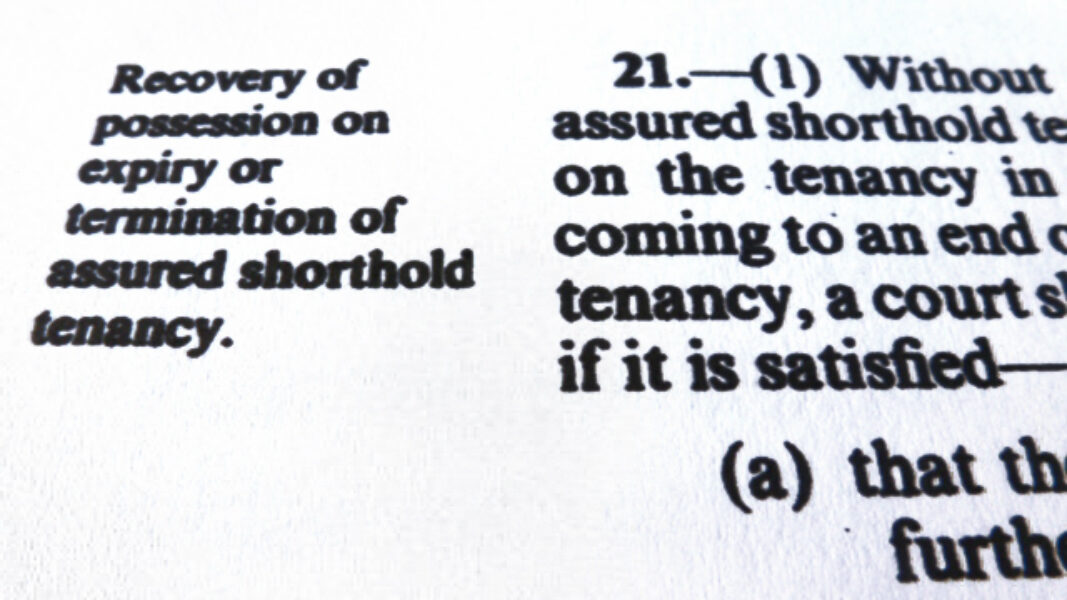Section 21 checker tool updated
A revised version of my section 21 checker tool has been placed in the Resources section.

Please use this new version rather than the previous one for checking whether s.21 notices in England are valid (at least until October, when the rules change again...).
Opportunities
The tool includes 90 questions (don't worry, you'll only have to answer a fraction of them!).
It therefore demonstrates the ludicrous complexity of the rules affecting whether a private landlord is entitled to a possession order.
Viewed from another perspective, there are certainly lots of opportunities for legal advisers and council officers to buy more time for assured shorthold tenants facing homelessness.
What's changed?
This version incorporates the (apparent) effect of Caridon Property Ltd v Shooltz. This was a recent case in the Central London County Court which suggests that, where an assured shorthold tenancy in England began on or after 1 October 2015, a section 21 notice cannot be served if a gas safety certificate is required and the landlord didn't provide the certificate before the tenant occupied the premises.
In addition, it would appear that - for the purposes of serving a valid s.21 notice - this error cannot be rectified unless a new tenancy is granted (or perhaps automatically arises, as a statutory periodic tenancy, under section 5(2) of the Housing Act 1988) and a gas certificate is given before this new tenancy begins.
Until the Government amends the relevant regulations or the Court of Appeal decides otherwise, tenants who didn't receive a gas safety record before they took up occupation can seek to defend possession claims on this basis.
Landlord's options
Private landlords who didn't serve a gas safety certificate before the tenant moved in but wish to obtain possession have the following options:
- serve the gas safety record within any remaining part of a fixed term tenancy, serve the s.21 notice once a statutory periodic tenancy has started, and on this basis argue that the Caridon issue doesn't arise (if the claim is defended on this basis)
or, if the tenancy is already periodic:
- serve a s.21 notice and apply for possession, with the inherent risk that the claim may be defended using the Caridon argument
- use a section 8 notice of seeking possession (assuming there are grounds) with the disadvantage, for most grounds, that the court must also be satisfied that it's reasonable to grant a possession order, or
- provide the gas safety certificate and then agree a new tenancy with the tenant.
The last option effectively means that a possession order cannot be obtained using the s.21 procedure for at least another six months.
Should homeless units be using Caridon?
When training homeless teams in recent months I've been asked a few times whether councils should be making use of this case, given that it’s a county court decision which doesn't create any binding precedent.
Well, councils are required as a matter of course to make decisions under the homelessness legislation as to whether they think notices are valid; notwithstanding the fact that the issue hasn't yet been resolved by the county court.
I don't see anything wrong in principle with councils making use of the Caridon argument where appropriate, to decide that an applicant is not threatened with homelessness.
However, it should be recognised that, due to poor parliamentary drafting, it's unclear whether the requirement to provide the gas safety record before the tenant occupies was intended to form part of the statutory requirements. Your local county court may take a different view to the circuit judge in Caridon.
Nevertheless citing Caridon and advising landlords to seek legal advice may result in many landlords not issuing a claim for possession. There's a risk that landlords may choose to issue a possession claim anyway, in which case tenants should be helped to defend possession claims. After all the defence will need to be pleaded.
Any such tenants will need specialist advice. So they should be referred to the nearest solicitor with a legal aid contract for housing.
Lessening the burden
One issue that's repeatedly come up when I've been training homeless teams is how checking notices is even more important now the Homelessness Reduction Act has come into force.
Identifying that a notice is invalid during the initial section 184 inquiries not only buys more time but significantly lessens the administrative burden. The s.189A assessment and a host of notification duties can be avoided (at least until a repeat application when a valid notice is served).
If, when the homeless application was made, the validity of the notice was initially unclear (so the s.184(1) 'reason to believe' threshold was met) the application can be turned into a non-statutory prevention case once it's determined that the notice is invalid (a 'not homeless' decision will need to be notified).
Assessment officers will usually want, of course, to continue working with the tenant to prevent homelessness (in which case this covering letter for the decision may come in useful).
Comments?
It you have any comments on the checker tool please drop me a line.
I also provide training on the section 21 requirements, which can be tailored according to the target audience.
Posted in category: Resources Assured shorthold tenancies Section 21
Comments